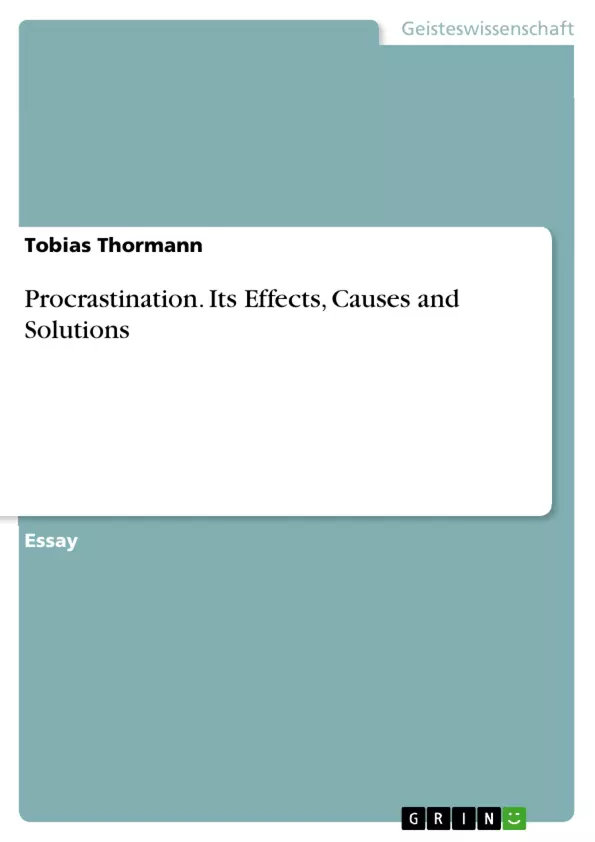This essay is concerned with the motives and consequences of procrastination. It will analyze why one procrastinates and show some specific ways to deal with procrastination.
Procrastination is an activity almost every high school student has done throughout their high school career. The meaning of procrastination is putting something off intentionally and delaying to work on a task to another day. Whether it is learning for an exam or writing a term paper due in a few weeks, almost every student will procrastinate at least once, no matter if they are role model students or well organized. Procrastination can have a huge impact on the grades of a student, but there is a lot to learn about why students do it and there are techniques to learn to cope with procrastination.
Inhaltsverzeichnis
- Academic Writing: Procrastination
- Introduction
- Reasons to Procrastinate
- Ways of Procrastination
- Solutions to Procrastination
- Conclusion
Zielsetzung und Themenschwerpunkte
Dieser Essay befasst sich mit den Motiven und Folgen von Prokrastination. Er analysiert, warum man prokrastiniert und zeigt einige spezifische Wege auf, um mit Prokrastination umzugehen.
- Analyse der Ursachen für Prokrastination
- Untersuchung der verschiedenen Formen von Prokrastination
- Entwicklung von Strategien zur Bewältigung von Prokrastination
- Bedeutung von Motivation und Denkweise für die Bewältigung von Aufgaben
- Die Rolle von Deadlines und Strafen bei der Überwindung von Prokrastination
Zusammenfassung der Kapitel
Das erste Kapitel stellt das Thema Prokrastination vor und definiert den Begriff. Es werden verschiedene Gründe für Prokrastination, wie z.B. die Suche nach Belohnung, die Angst vor Misserfolg und die Angst vor Erfolg, erläutert. Das zweite Kapitel beschäftigt sich mit den verschiedenen Formen von Prokrastination und zeigt, wie man durch Selbstbeobachtung und die Erstellung eines Prokrastinations-Logs seine eigenen Muster erkennen kann. Das dritte Kapitel konzentriert sich auf die Lösung von Problemen, die durch Prokrastination entstehen. Es werden verschiedene Ansätze vorgestellt, wie z.B. die Erhöhung des Einsatzes durch Deadlines und Strafen, sowie die "Walking the Plank"-Übung, die dabei helfen soll, die Angst vor Misserfolg zu überwinden.
Schlüsselwörter
Prokrastination, Motivation, Selbstbeobachtung, Denkweise, Deadlines, Strafen, Angst vor Misserfolg, Angst vor Erfolg, "Walking the Plank"-Übung, Selbstmotivation, Aufgabenbewältigung.
Häufig gestellte Fragen
Was ist die Definition von Prokrastination?
Prokrastination bedeutet das absichtliche Aufschieben von Aufgaben auf einen späteren Zeitpunkt, obwohl man weiß, dass dies negative Folgen haben kann.
Was sind die häufigsten Ursachen für das Aufschieben von Aufgaben?
Zu den Motiven gehören die Suche nach sofortiger Belohnung, die Angst vor Misserfolg, aber interessanterweise auch die Angst vor Erfolg.
Wie kann man sein eigenes Prokrastinationsverhalten analysieren?
Die Arbeit schlägt die Führung eines "Prokrastinations-Logs" vor, um durch Selbstbeobachtung die eigenen Muster und Auslöser zu erkennen.
Welche praktischen Lösungen werden zur Überwindung angeboten?
Strategien umfassen die Erhöhung des Einsatzes durch Deadlines und Strafen sowie gezielte Übungen zur Steigerung der Selbstmotivation.
Was verbirgt sich hinter der "Walking the Plank"-Übung?
Dies ist eine spezifische Technik, die im Essay vorgestellt wird, um die Angst vor Misserfolg zu überwinden und den ersten Schritt bei schwierigen Aufgaben zu erleichtern.
- Quote paper
- Tobias Thormann (Author), 2013, Procrastination. Its Effects, Causes and Solutions, Munich, GRIN Verlag, https://www.grin.com/document/299008



